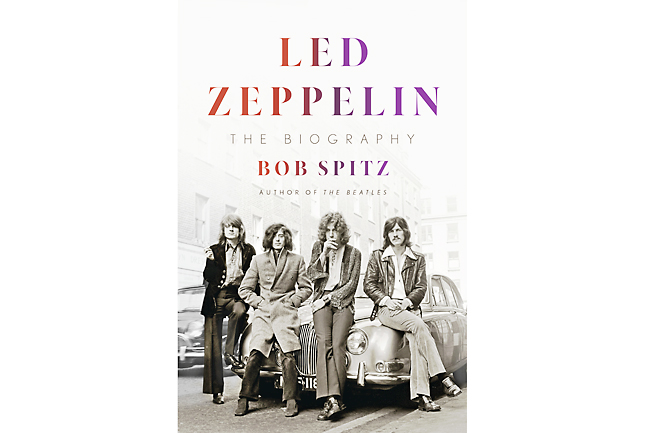Zachary Lipez
THE WASHINGTON POST – Depending on whom you ask, Led Zeppelin embodied either the best or worst of rock ‘n’ roll. The band – Robert Plant, Jimmy Page, John Paul Jones and John “Bonzo” Bonham – epitomised either the dreamy idealism of the 60’s or the bloated vapidity of the 70’s. It was either an appreciation of blues and folk or a wholesale theft of those genres.
While critically underappreciated for the 12 years it existed, Led Zeppelin’s art has since been both revered and mocked. It’s generally accepted that punk rock was – to a degree – a response to what many saw as the self-indulgence and pompousness of the band and others of its ilk who shared a proclivity for stadium spectacle and extended drum solos.
The 1984 satirical rockumentary, This Is Spinal Tap, was inspired in part by the same aspects; the film got some of its biggest laughs by utilising Led Zeppelin’s absurd 1977 Stonehenge stage set. Today, few deny the artistic value of the group’s catalogue, but it would be an understatement to say that the Led Zeppelin’s history is complicated.
The cheeky subtitle of Bob Spitz’s new book Led Zeppelin: The Biography is bold considering the numerous books about the band. Spitz, who has written well-regarded biographies of the Beatles and Julia Child, delivers a 600-page tome that collects every (reliable) story previously reported, and is bolstered by original reporting and interviews – all delivered in brisk and straightforward prose. But readers be warned: Spitz doesn’t hold back in describing the band’s antics, its displays of ego and cruelty that today’s audiences might find less than acceptable.
The book begins with a witty prologue chronicling what it was like for a young Steven Tyler (later of Aerosmith and being Liv Tyler’s dad) to see the band that arguably invented heavy metal play the heavy, progressive blues that it didn’t invent but exemplified. The prologue is breathless and slangy, befitting the point of view of a hormonal rocker having his mind blown. It’s cute. The reader is happy for Steven Tyler.

Then the book gets serious. “In the beginning there was the blues,” Spitz intoned, before jumping right into postwar England and recounting the seismic effect the blues had on the country’s nascent youth culture. The book is peppered with musical references that Spitz describes as evocatively as mere writing can describe music, and cultural references that may cause some readers to fall into a rabbit hole of music minutia. It may cause others to give up.
Spitz is admirably unsparing, without being egregiously harsh, in his assessments of the attempts by White British musicians to approximate the sounds coming from imported, eagerly collected records by legends such as Howlin’ Wolf and Muddy Waters. When American blues musicians start touring the United Kingdom (UK), the joy felt by wide-eyed young Eric Claptons and Jimmy Pages is contagious. Also contagious, at first, is Spitz’s affection for the book’s main subjects. At first, all four men who formed Led Zeppelin are lovable. Whether it’s Page and Jones’ Zelig-esque studio work or Bonham and Plant striving as a working-class mid-country bar band, the reader is pulling for each of them.
But after Led Zeppelin forms, or at least once they gain even a modicum of success, little is endearing about any of the band members besides the music they make. Once the group’s thuggish manager, Peter Grant, enters the picture and it becomes clear, over and over, that nobody will tell him or any member of the band “no” for the next decade, human decency joins the hotel televisions in going out the window.
Led Zeppelin: The Biography was written without the cooperation of any surviving members of the band. It’s hard to blame them. While largely admiring in tone, no grisly detail is omitted – and who would want to answer for any number of the stories told, especially when, in 2021, young and extremely high is no longer considered exculpatory. Even without the assistance of Led Zeppelin or its inner circle, Spitz manages to tell a compelling story (despite a few factual errors in my edition). The music criticism is often insightful and evocative: Spitz describes the bass in Good Times, Bad Times as pulling “at the centre like an undertow”, and Robert Plant’s singing as “otherworldly, like it was coming out of a pneumatic compressor”.
The world Led Zeppelin inhabited is fascinating. But without the protagonists’ input, the centre feels incomplete – sketches within a painting. John Paul Jones comes off best by not coming off at all. Robert Plant’s feckless pliancy throughout is hard to square with the exploratory nature of his later work. Jimmy Page comes off as a caricature of not-exactly-dumb-but-hardly-smart mystical libertarianism. John Bonham and Peter Grant, both dead, are portrayed as designated monsters.
The book ends abruptly, with sputtering reunion attempts and amiable charity gigs. Fans and naysayers alike will be disappointed that in Spitz’s telling nothing any of the men did after Led Zeppelin broke up seems to warrant much discussion. As a compendium of the often brilliant music created by ravaged souls, the book works well enough, but at this point both Led Zeppelin’s fans (and critics) yearn for more.


